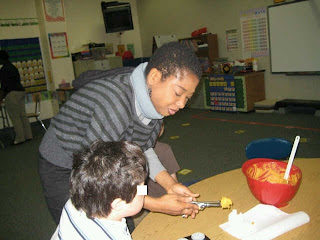Written by Jennifer Hill, MA, CCC-SLP
For many of us the summer brings the opportunity to sleep in late, go to bed later, and generally have less structure around the home in regards to routines and meal times. With the start of school, there is an abrupt shift to following more rigid routines. It is often a difficult transition for parents, as well as children.
Teachers are going through these same transitions: getting to know the personalities and learning styles of sometimes more than 20 children can be quite a challenge.
If your child has special needs, it is especially important to share information with each member of the “team” – classroom teacher, school administration, speech-language pathologist, occupational therapist, etc.
Here are eight suggestions to help your child transition more easily into a successful and rewarding school year.
1. Consistent Schedule:
Try to be consistent with your bedtime and waking times, even on the weekends, until your child adjusts to their fall schedule.
2. Ask the teacher about classroom routines and expectations:
Practice these routines at home, such as going to the door and waiting, pushing in chairs, hanging up backpacks, sitting at the table for progressively longer periods of time, and so forth. These routines can be rehearsed throughout the year until no longer necessary.
3. Share school routines with your child’s therapists:
Share classroom routines and academic expectations with your speech-language pathologist and/or occupational therapist. Perhaps these goals can be implemented into treatment sessions.
4. Give the teacher some tips on your child’s speech and language capabilities:
In the event that your teacher may have difficulty understanding your child’s speech and language, ask your speech-language pathologist to provide a list of frequently-used gestures, signs, word approximations and consonant replacements.
5. Let the teacher know what your child’s strengths and weaknesses are:
Sometimes, a lesson can be designed incorporating your child’s interests or strengths in order to help them to be successful.
6. Provide tips on improving your child’s attention and cooperation:
Ask your speech-language pathologist and/or occupational therapist for suggestions they have found useful to improve attention and cooperation. Some kids benefit from frequent verbal reinforcement, others may need tangible reinforcers, such as stickers and stamps to remain on-task. Many children with special needs do well with visual reinforcements, such as token systems or visual times in order to sustain attention and cooperation for tasks.
7. Provide information about negative behavior:
Make a list of things that may trigger negative behaviors from your child and share them with his or her classroom teacher and school administration. Likewise, share any calming strategies that work with your child. Perhaps, you can work with your occupational therapist to make a “tool chest” of calming or arousing toys that can be used in the classroom, as needed.
8. Be clear and honest about your child’s behavior:
Preparing your child’s teacher for potential challenges is very important for a positive child-teacher relationship. Allow your teacher some time to implement any strategies and allow your child the time to adjust to new expectations.
About the author:
Jennifer Hill, MA, CCC-SLP is a speech-language pathologist at the Kaufman Children’s Center for Speech, Language, Sensory-Motor & Social Connections, Inc.. She is trained in Links to Language, PECS, and The Kaufman Speech to Language Protocol




































.jpg)
